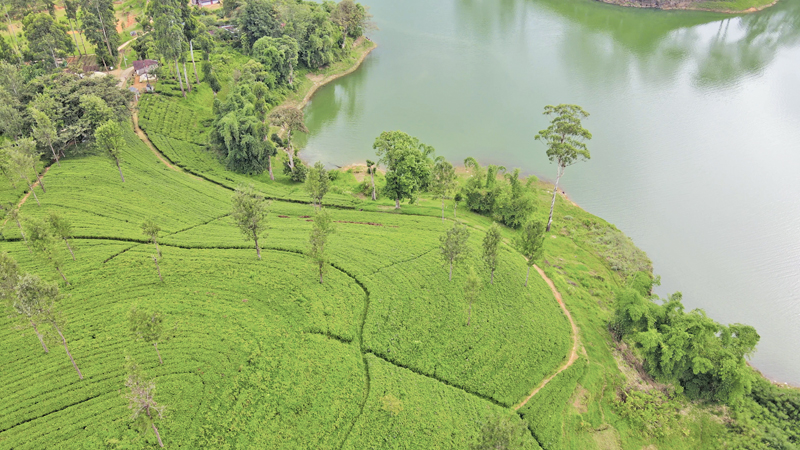The gravel road crunches beneath tires, a stark contrast to the miles of smooth pavement just travelled. Lush green tea bushes stretch out on either side, row upon row of emeralds against the hills. A charmingly aged bungalow emerges, its vintage grandeur preserved. Here, tucked away from civilisation’s noise and bustle, lies Bogawantalawa Tea Estates PLC (BTE).
The spotlight is often on the hardships tea estate workers face – a never-ending need for improved living conditions. A visit to Bogawantalawa plantations opens a different lens. It reveals the potential and hidden capabilities within these communities.
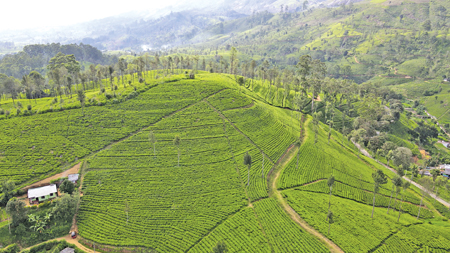 The plantation sector actively contributes to Sri Lanka’s success. The sustainability practices adopted by Bogawantalawa Tea Estates are one simple yet extraordinary success story.
The plantation sector actively contributes to Sri Lanka’s success. The sustainability practices adopted by Bogawantalawa Tea Estates are one simple yet extraordinary success story.
More than a tea producer, BTE has become a shining example of how humans and nature can thrive together. They pushed the boundaries of tradition to welcome innovative renewable energy projects that weave a thread of sustainability into the very fabric of their operations. In a world that wrestles with the ever-growing shadow of climate change, BTE sets a new standard of environmental responsibility – not only in Sri Lanka but around the globe.
Bogawantalawa’s commitment to sustainability extends beyond energy. The tea company has invested in water conservation techniques, organic farming practices, and community outreach programmes, creating a holistic approach to environmental stewardship.
As a subsidiary of Metrocorp, BTE has taken centre stage in pursuing sustainable and climate-positive practices. It breaks away from conventional tea plantation practices. It embraced renewable energy and earned the title: “World’s First Tea Growing, Manufacturing, and Marketing Company Offering Uncompensated Climate Positive Teas, certified for 100% renewables.”
Pioneering journey
BTE’s solar trials initiated in 2010 paved the way for large-scale developments in 2015. Despite challenges such as low solar irradiation levels, the company strategically utilised the up country’s favourable factors, ambient air temperature, calm wind, less RH, and fewer aerosols, to harness the power of solar energy.
BTE is Sri Lanka’s first industry to initiate a commercial-scale solar project – a challenge to the core amid a host of negative criticisms. However, they overcame challenges through a scientific approach and a forward-looking perspective. Sri Lanka Sustainable Energy Authority, Ceylon Electricity Board, and the University of Peradeniya played vital roles in supporting the endeavour. National and international consultant assistance was also sought for initial technical guidance.
Currently, 2300 kW of solar energy capacity has been installed via conversion to state-of-the-art solar-powered rooftops at all manufacturing plants in the tea estates and the packaging plant in Colombo. The result is an annual production of three million KWH, saving 2500MT of greenhouse gas (GHG) emissions. The total value of the investment surpasses Rs 300 million.
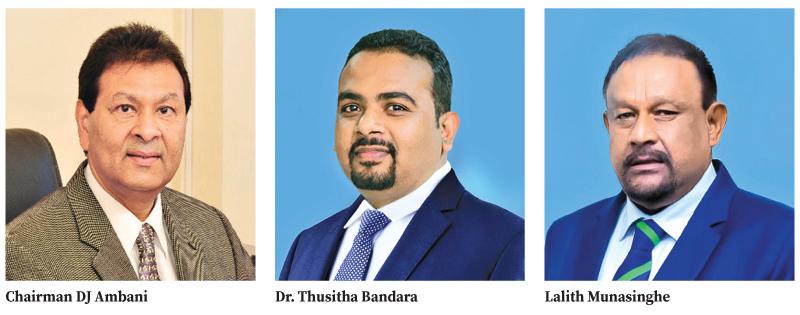
The company believes this is a sustainable investment for the future that is financially viable, environmentally friendly, and socially accepted. Bogawantalawa Tea Estates envisions a 10MW capacity Solar Park within the plantation. This project promises to generate 15 million electricity units and reduce 12,000 MT of greenhouse gas (GHG) emissions annually.
The company has been researching this project since 2015, identifying the areas unsuitable for tea replanting and suitable for diversification. Upon receiving government approvals, the company will commence the project with an investment of approximately Rs 1.6 billion.
Moving to the next level, Bogawantalawa investigates its Community engagement project with Renewables. The new engagement proposes Communal Solar Models for workers’ houses to reduce their electricity bills. This Bogawantalawa Green initiative contributes to lowering living costs. BTE looks after a population of 44,000, including 7,275 direct employees and 9,207 houses.
As Sri Lanka’s first community-based Solar Project, the proposed community-based solar system will achieve the targets and be a turning point for the tea industry. The project will also support a connection of approximately 20 MW to the national grid.
Sustainable solar success
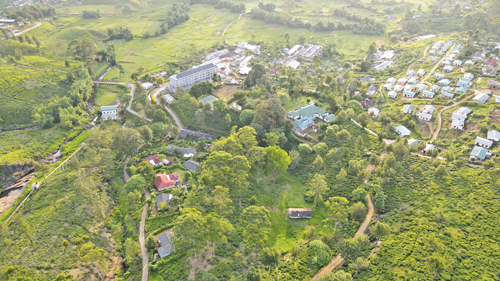
Bogawana Estate Solar System
BTE Director of Low Country Operations, Sustainability and Research and Development Dr Thusitha Bandara highlighted the importance of conducting a comprehensive assessment of the sustainability of a specific geographical location to implement a solar project.
“This assessment must take into account various critical factors. They include the adequacy of sunlight exposure, the prevailing regulatory framework, initial capital outlays, ongoing operational and maintenance costs, the dependability of technology, financial forecasts, the potential societal impact, and the trustworthiness of technical collaborators.
When an individual or entity intends to embark on such a project, seeking consultation from an impartial service provider is advisable. In the event that the chosen location is considered suitable and the project is deemed feasible, it is prudent to identify the requisite technologies, particularly solar panels and inverters, along with other necessary accessories.
The procurement process should involve the solicitation of competitive bids from reputable suppliers, preceded by the formulation of precise specifications,” Dr Bandara said.
In the supplier selection process, it is recommended to conduct due diligence by consulting with relevant authorities such as the Sri Lanka Sustainable Energy Authority and seeking feedback from previous clients. It is essential to exercise caution in supplier selection, as the renewable energy sector is susceptible to fraudulent actors. Failure to engage a trustworthy supplier may result in project failure. It may subsequently cause financial and reputational damage.
Diversifying its renewable energy portfolio, Bogawantalawa has commissioned 3.2 MW Micro Hydro Power Projects within the plantation. Bogawantalawa’s sister company, Eco Power (Pvt) Ltd, has commissioned over 40 MW in Sri Lanka and undertaken numerous projects overseas, contributing to a broader global shift towards sustainable energy practices.
Dr Bandara added that Bogawantalawa holds the distinction of being the first tea company worldwide to have successfully registered one of its hydropower projects under the Gold Standard Carbon Credit Scheme.
Consequently, Bogawantalawa is the sole entity globally capable of offering climate-positive teas, concurrently in setting with Gold Standard Carbon Credits and utilising 100% renewable energy sources. This achievement has been accomplished systematically and scientifically, adhering to the most stringent global standards.
Innovation and climate action
At the core of the company’s efforts lies the integration of Climate Smart Agricultural practices across all estates, a pledge to the overall ecosystem. According to Dr Bandara, this enhances the quality of life of the tea harvesters and community.
“Our emphasis on renewable energy, exemplified by our solar and hydropower projects, underscores our proactive stance in minimising our carbon footprint. The attainment of ‘Uncompensated Climate Positive’ status signifies a benchmark and a paradigm shift in how we approach sustainability within the tea industry. We continuously explore new avenues for innovation. Research and Development (R&D) projects for natural fertilisers and efficient water management exemplify our commitment to a comprehensive and sustainable approach to tea cultivation.”
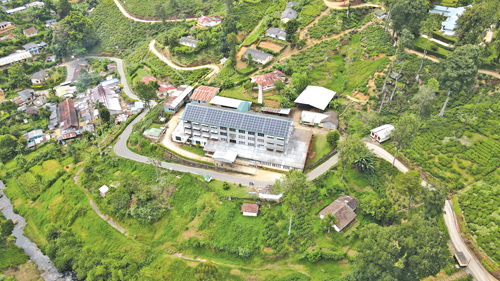
Kotiyagalla Estate Solar System
The Executive Director of Bogawantalawa Tea Estates, Lalith Munasinghe, extended an invitation to leaders, corporations, and individuals who are passionately committed to global climate action conversations to join the Bogawantalawa team.
“We are committed to working together and leading in tackling climate change, establishing ambitious targets, and promoting a sustainable culture beyond Bogawantalawa, bringing about good change throughout the sector,” Munasinghe added.
Through internal projects, Bogawantalawa intends to generate 14 million electricity units annually, saving 9100 MT of GHG emissions. As part of its continued efforts to scale up renewable energy capacity and expand its carbon-sinking capacity, Bogawantalawa plans to install a further 8.25 MW of wind power across two projects in the Bogawantalawa Valley.
Four years of wind measurements in the Bogawantalawa Valley, conducted using a Wind-Solar Mast, have been utilised to develop this project. The project awaits the government approval green-light. The potential power generation through this initiative is estimated at 8.9 million electricity units, with potential GHG emission savings reaching 7000 MT annually.
2019 marked a pivotal moment for Bogawantalawa as it achieved the prestigious’ Net Zero Energy’ status. This accolade, earned through harnessing renewable energy via solar and hydropower projects, signifies that the energy generated surpasses the company’s consumption.
Beyond renewable energy
Bogawantalawa’s operations extend beyond renewable energy initiatives. Key initiatives include ongoing research and development projects on natural fertilisers, efficient water management, and agroforestry practices.
The company’s research team continuously explores ways to utilise natural resources instead of chemical fertilisers, implementing practices like natural composting and site-specific fertilisers. The emphasis on agroforestry involves managing nurseries with 200,000 seedlings per year, featuring commercial species and natural species, herbs, and fruit plants.
Alongside environmental sustainability, the company invests in community development, ensuring a more focused approach to improving nutrition, livelihoods, and income. Initiatives such as organic vegetable gardens, income-generating projects, healthcare, and women empowerment highlight the company’s effort to uplift lives in tandem with environmental stewardship.
The company continuously seeks new ways to conserve the environment while offering unrivalled teas with exquisite, unique characteristics reflecting Mother Nature’s blessings.
Preserving the environment and addressing the negative impacts of climate change have become integral aspects of Bogawantalawa Tea Estates (BTE). Aligned with their motto of being “Passionate Growers with sustainability at heart,” sustainability is not just a goal but a way of life at Bogawantalawa. The company has embraced Climate Smart Agricultural practices across all estates, emphasising the overall ecosystem and quality of life for their tea harvesters. This commitment extends to bringing the finest teas to the world, ethically produced with the highest level of sustainability.
The sustainability initiatives at Bogawantalawa are anchored on three pillars: social sustainability towards people, environmental sustainability towards the planet, and economic sustainability towards profits. Reflecting a deep-rooted belief that the Earth does not belong to us but rather, “We belong to Earth,” the company considers sustainability a core pillar of its daily business operations, making it a way of life.
Bogawantalawa also emphasises responsible production and consumption, driven by a culture of sustainability. The company boasts control over the entire value chain, from growing to packaging, and makes it a unique positive force in the industry.
As part of its mission to be environmentally sustainable, Bogawantalawa actively engages in critical initiatives, including Research and Development (R&D) projects that focus on utilising natural fertilisers and promoting efficient water management. These efforts reflect a holistic approach to sustainability, considering various aspects such as soil health, water conservation, and the overall well-being of tea harvesters.
Climate-positive tea cultivation
Bogawantalawa Tea Estates PLC Group Chairman Dinesh Ambani pointed out that sustainability initiatives have become integral to the company’s philosophy.
“Our aspiring need to climate-positive tea cultivation and manufacturing goes beyond being a strategic choice. It reflects our deep-seated belief that sustainability is not just an initiative but a way of life. At Bogawantalawa, we consider ourselves ‘passionate growers with sustainability at heart,’ and this philosophy resonates through every aspect of our operations,” Ambani said.
From adopting Climate-Smart Agricultural practices to strategically harnessing both conventional and non-conventional renewable energy sources, the company has modernised the processing centres and prioritised the welfare of the human capital. This holistic approach has propelled the company towards achieving long-term sustainability goals.
“Our Climate-Smart and ecologically supportive initiatives have also played a vital role in accomplishing our Sustainable Development Goals (SDGs). We stand recognised internationally as the World’s First Climate-Positive Tea Company.”
One of the most delightful aspects of staying in a tea bungalow is the charming period aesthetic that has been lovingly preserved throughout the years.
****
Bogawantalawa’s journey towards sustainable practice
1. Holistic sustainability approach: BTE goes beyond being a tea producer. The tea company showcases a holistic approach to sustainability that integrates renewable energy, community development, and environmental stewardship.
2. Renewable energy initiatives: BTE spearheads innovative renewable energy projects, which include a large-scale solar project initiated in 2010. It boasts 2300 kW of solar energy capacity, saving 2500MT of greenhouse gas emissions annually. The company envisions a 10MW Solar Park and actively engages in micro hydropower projects.
3. Community engagement: BTE’s community-based solar models aim to reduce electricity bills for workers, contributing to lower living costs. The company looks after a population of 44,000, and the proposed project could support a connection of approximately 20 MW to the national grid.
4. Renewable energy diversification: BTE plans to install 8.25 MW of wind power across two projects in the Bogawantalawa Valley, with potential GHG emission savings reaching 7000 MT annually.
5. Recognition and achievements: The company achieved ‘Net Zero Energy’ status in 2019, surpassing its energy consumption through renewable sources. Bogawantalawa is recognised internationally as the World’s First Climate-Positive Tea Company.
6. Beyond renewable energy: BTE focuses on research and development projects for natural fertilisers, efficient water management, and agroforestry practices. The company emphasises a three-pillar sustainability approach: social sustainability towards people, environmental sustainability towards the planet, and economic sustainability towards profits.





